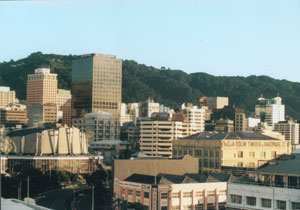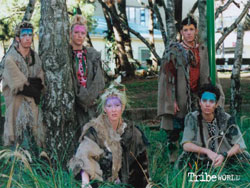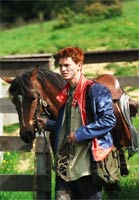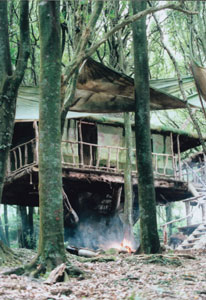 One of the forgotten values in the modern world is the love of the environment. We live in silvered cityscapes. Cement and Chrome decorate our world like trees in a forest. The only truly natural element that we city-folk see is the sky…and that is often discoloured by smog and light-pollution.
One of the forgotten values in the modern world is the love of the environment. We live in silvered cityscapes. Cement and Chrome decorate our world like trees in a forest. The only truly natural element that we city-folk see is the sky…and that is often discoloured by smog and light-pollution.
Our only connection to our food comes from opening the can. The only animals we see are our domestic pets and, on rare occasions, the docile animals at the zoo. Plants live in pots and are often made of plastic. Our feet hardly touch the ground–we are transported horizontally in automobiles, vertically in elevators.
For those of us living in more rural areas, the scene may look greener but it is not all that much different. Plants do not grow freely; they are planted strategically, be it for commercial or aesthetic reasons. Animals are harvested like plants. Wild animals are fenced in or fenced out. Only birds roam freely, but they are restricted as well by the conditions of the artificially adapted environment.
Humans are moving steadily across our environment, dividing and redividing property, altering ecosystems to suit our liking.
….We are slowly extinguishing all other life on our planet. If current trends continue, over half of the species of life currently on Earth will be gone in one hundred years. This is not an estimate. It is a fact. This is the fastest mass extinction in the history of the world—even surpassing the speed with which the dinosaurs died out!
It is easy to dismiss the degradation of the natural world.
 From a utilitarian standpoint (thank you, Ayn Rand), it might almost seem to be a blessing in disguise. Plants and animals are dying off and clearing out of our way more quickly than we can clear them out themselves. It could be an ecological revolution! No more pigeons and ants in our way, no more trees to clear away to make room for houses or farms. It’s as if nature is anticipating man’s needs and doing our dirty work for us.
From a utilitarian standpoint (thank you, Ayn Rand), it might almost seem to be a blessing in disguise. Plants and animals are dying off and clearing out of our way more quickly than we can clear them out themselves. It could be an ecological revolution! No more pigeons and ants in our way, no more trees to clear away to make room for houses or farms. It’s as if nature is anticipating man’s needs and doing our dirty work for us.
From a simply self-centered perspective, who cares? Unless the trees are screaming in my yard or the deer come knocking on my door with a formal complaint, the environment just doesn’t affect me. ….Right?
Not so fast! We may have moved as far as we can manage out of the forests and meadows of our nature-inflicted past, but we still depend on plants and animals. Plants may seem like inanimate objects, but they actually have a very slow-moving animated life which includes changing position, and even breathing. Whereas animals need oxygen and breathe out carbon dioxide, plants intake carbon dioxide and replace it with oxygen. They are the yin to our yang. Six Degrees of Separation (or: my relationship to a tree)
If one person were to sit in a sealed room, eventually the air would run out of oxygen, and cause the poor person to suffocate. On a larger scale, if humans animals were to run around in the closed atmosphere of planet Earth with no reciprocal plant system, the oxygen in the atmosphere would not last forever. Nature is founded on this principal of opposition, balance. We breathe the expelled breath of plants. They photosynthesise our breath.
And not only that! Recent research has shown that plants can just as easily chemically alter carbon monoxide, the dangerous pollutants created by cars, cigarettes, and many of man’s other polluting toys. Plants just sit silently by and thanklessly clean up our invisible messes.
 So we’ve agreed to save the plants on the planet, but can’t most of the animals just disappear? Not quite. Nature is so delicately balanced that each and ever species serves a special purpose. Busy bees buzz around pollinating plants (as plants seem too lazy to breed without assistance). Nuts and seeds are often distributed in the dung of herbivorous and omnivorous animals. Predators help to keep their prey from over-populating and over-expending resources.
So we’ve agreed to save the plants on the planet, but can’t most of the animals just disappear? Not quite. Nature is so delicately balanced that each and ever species serves a special purpose. Busy bees buzz around pollinating plants (as plants seem too lazy to breed without assistance). Nuts and seeds are often distributed in the dung of herbivorous and omnivorous animals. Predators help to keep their prey from over-populating and over-expending resources.
Each and every species has an important role to play in the web of life. And when one species dies out, and its role goes unplayed, it effects the world around it allowing too little of one species to leave, too much of another to flourish, and the raises and declines in the effected populations of plants and animals in turn affect other species of plants and animals and so on.
Think of it as a change in the economy, and how that affects everything from your country’s international relations to your family’s monetary stability.Where you gonna run to? Where you gonna hide?
Despite our seemingly successful efforts at removing ourselves from nature, humans are not immune to the chains of reactions to changes in nature. A plague of locusts can still destroy crops, killing wheat, fruits and vegetables, even the hay we feed to animals used for meat and milk. Suddenly, a few bugs have rendered us hard pressed to serve food from any of the food-groups.
We are still at the mercy of the food-chain, no matter how sheltered we are.
Speaking of shelter, even that is not safe from floods, hurricanes, cyclones, typhoons, droughts…..
Here we sit, in our cement jungle, and discover that we never left the real jungle after all. Bob and Bluebell say hello.
 The characters in The Tribe know better than anyone how close they are to their environment. Whereas their parents may have been able to forget that they still had their basic necessities, the child survivors must think about food, water, and shelter at every moment.
The characters in The Tribe know better than anyone how close they are to their environment. Whereas their parents may have been able to forget that they still had their basic necessities, the child survivors must think about food, water, and shelter at every moment.
As time goes on, many begin to realise that barren cities are no longer a practical place to fulfil these needs.
It is back to nature that they go, with a better mind to respect their resources.
The kids on The Tribe know first-hand that resources can run out. They understand that they rely on the people around them. Likewise they understand that they rely on the environment, and that they have an impact on it.
It is important that they realise that they are not immune to the cruelties of nature. It is easy to assume that man’s only natural predator is man. But small seeming-pests like the rats that infected the mall or mosquitos that attack in humid forests, carrying diseases as deadly—if not as contagious—as the virus. Likewise, now that the children are out of the protection of the city, large predators, like those that once lived in empty cages at the zoo, are able to stake their claim on humans—the new white meat.
Likewise, the children can learn to use the wild world around them. Efforts are made at farming and agriculture. Some efforts step further back in man’s history, looking not to tame the wild world but to catch it—through hunting and foragimg.
The EcoTribe especially is very conscious of making sure that th

